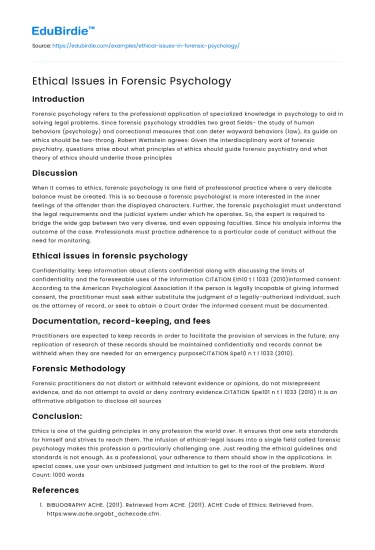Table of contents
- Introduction
- Discussion
- Ethical issues in forensic psychology
- Documentation, record-keeping, and fees
- Forensic Methodology
- Conclusion:
- References
Introduction
Forensic psychology refers to the professional application of specialized knowledge in psychology to aid in solving legal problems. Since forensic psychology straddles two great fields- the study of human behaviors (psychology) and correctional measures that can deter wayward behaviors (law), its guide on ethics should be two-throng. Robert Wettstein agrees: Given the interdisciplinary work of forensic psychiatry, questions arise about what principles of ethics should guide forensic psychiatry and what theory of ethics should underlie those principles
Discussion
When it comes to ethics, forensic psychology is one field of professional practice where a very delicate balance must be created. This is so because a forensic psychologist is more interested in the inner feelings of the offender than the displayed characters. Further, the forensic psychologist must understand the legal requirements and the judicial system under which he operates. So, the expert is required to bridge the wide gap between two very diverse, and even opposing faculties. Since his analysis informs the outcome of the case. Professionals must practice adherence to a particular code of conduct without the need for monitoring.
Save your time!
We can take care of your essay
- Proper editing and formatting
- Free revision, title page, and bibliography
- Flexible prices and money-back guarantee
Ethical issues in forensic psychology
Confidentiality: keep information about clients confidential along with discussing the limits of confidentiality and the foreseeable uses of the information CITATION Eth10 t l 1033 (2010)Informed consent: According to the American Psychological Association if the person is legally incapable of giving informed consent, the practitioner must seek either substitute the judgment of a legally-authorized individual, such as the attorney of record, or seek to obtain a Court Order The informed consent must be documented.
Documentation, record-keeping, and fees
Practitioners are expected to keep records in order to facilitate the provision of services in the future; any replication of research of these records should be maintained confidentially and records cannot be withheld when they are needed for an emergency purposeCITATION Spe10 n t l 1033 (2010).
Forensic Methodology
Forensic practitioners do not distort or withhold relevant evidence or opinions, do not misrepresent evidence, and do not attempt to avoid or deny contrary evidence.CITATION Spe101 n t l 1033 (2010) It is an affirmative obligation to disclose all sources
Conclusion:
Ethics is one of the guiding principles in any profession the world over. It ensures that one sets standards for himself and strives to reach them. The infusion of ethical-legal issues into a single field called forensic psychology makes this profession a particularly challenging one. Just reading the ethical guidelines and standards is not enough. As a professional, your adherence to them should show in the applications. In special cases, use your own unbiased judgment and intuition to get to the root of the problem. Word Count: 1000 words
References
- BIBLIOGRAPHY ACHE. (2011). Retrieved from ACHE. (2011). ACHE Code of Ethics: Retrieved from. https:www.ache.orgabt_achecode.cfm.
- Barker, P. J. (2011). Mental health ethics: The human context. Abingdon, Oxon: Routledge. Barker, P. J. (2011). Mental health ethics: The human context. Abingdon, Oxon: Routledge.
- Connor, W. E. (2013). Connor, W. E. (2013). Code of Ethics: Retrieved from. https:secure.ethicspoint.comdomainmediaengui15228Code_of_Ethics_1_22_07.pdf.
- Ethical principles of psychologists and code of conduct. (2010).
- Ethical principles of ethics for psychologists. (2010).
- Gerig, M. S. (2007). Gerig, M. S. (2007). Foundations for mental health and community counseling: An introduction to the profession. Upper Saddle River, N.J: Pearson, Merrill
Did you like this example?
Make sure you submit a unique essay
Our writers will provide you with an essay sample written from scratch: any topic, any deadline, any instructions.
Cite this paper
-
APA
-
MLA
-
Harvard
-
Vancouver
Ethical Issues in Forensic Psychology.
(2023, April 21). Edubirdie. Retrieved December 19, 2024, from https://edubirdie.com/examples/ethical-issues-in-forensic-psychology/
“Ethical Issues in Forensic Psychology.” Edubirdie, 21 Apr. 2023, edubirdie.com/examples/ethical-issues-in-forensic-psychology/
Ethical Issues in Forensic Psychology. [online].
Available at: <https://edubirdie.com/examples/ethical-issues-in-forensic-psychology/> [Accessed 19 Dec. 2024].
Ethical Issues in Forensic Psychology [Internet]. Edubirdie.
2023 Apr 21 [cited 2024 Dec 19].
Available from: https://edubirdie.com/examples/ethical-issues-in-forensic-psychology/
copy






 Stuck on your essay?
Stuck on your essay?

